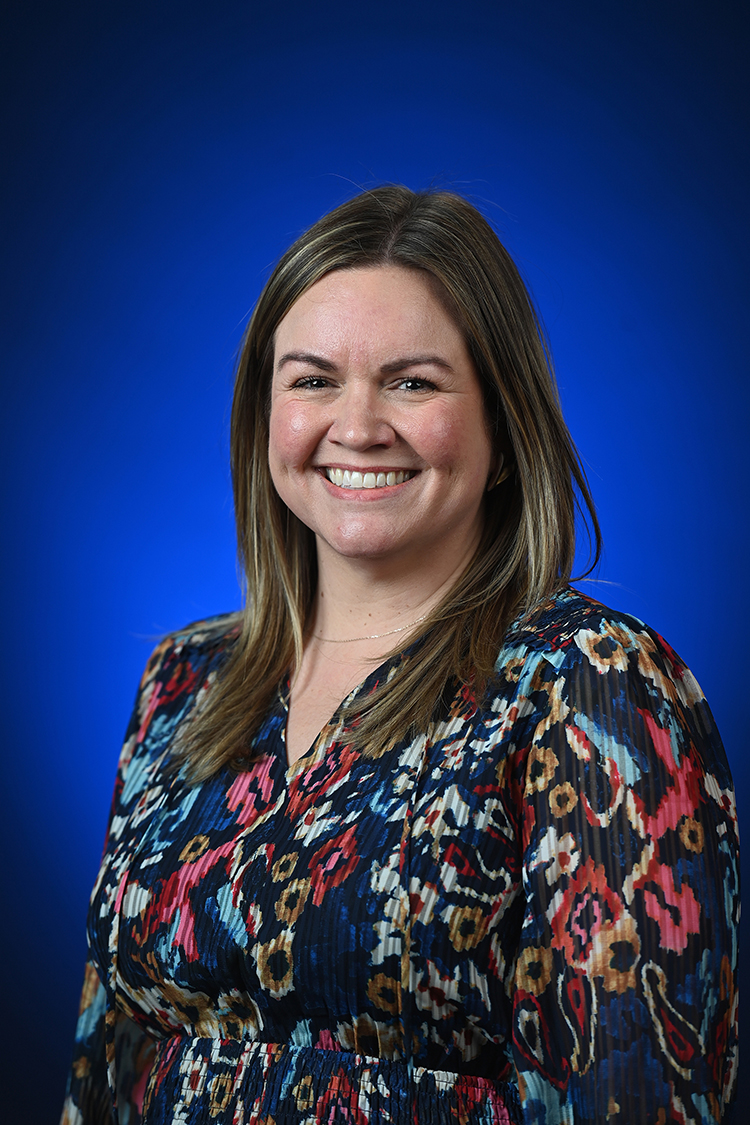
University of Mississippi pharmacy professor Ashley Crumby plans to use her AACP New Investigator Award to study how to make mentoring more effective for student pharmacists. Photo by Kevin Bain/Ole Miss Digital Imaging Services
Crumby recognized for excellence in research efforts with grant
The American Association of Colleges of Pharmacy has recognized Ashley Crumby, instructional assistant professor in the University of Mississippi School of Pharmacy, with a 2023 New Investigator Award.
AACP annually awards researchers in the first five years of their careers to help them establish baseline data for a body of research work. The 2023 class of 15 researchers represents 15 colleges and universities across the country.
Awards are made for research that can influence patient outcomes, pharmacy practice and pharmacy education.
Crumby received the designation for her project to measure “Factors Associated with Student Pharmacist Engagement in Mentoring Relationships.” The project will focus on mentorship and its role in students’ education and professional development.
“The goal of the project is to identify existing motivators and barriers that influence student pharmacists’ engagement in mentoring relationships – through one-on-one conversations, group discussions and, ultimately, a broader survey,” Crumby said.
“I am excited to get started with the research and am humbled to have even been selected.”
Crumby’s award puts a spotlight on an area of pharmacy education deserving of ongoing research, said Kris Harrell, associate dean for academic affairs and professor of pharmacy practice.
“This award is a big honor for an emerging leader in pharmacy education like Ashley, one that can serve as a springboard for other opportunities and future research recognition,” Harrell said.
Crumby looks to achieve three goals with her research:
- Understand why students do not participate in mentoring
- Share those findings with other pharmacy educators
- Increase participation in the Ole Miss pharmacy school’s mentoring program
Student sentiment will be gauged through a survey with UM students and those at Belmont University in Nashville.
“We hope to identify which methods of mentorship best appeal to students, and this will lead to an expansion and enhancement of current mentorship opportunities,” Crumby said.
While every accredited pharmacy school is required to offer mentoring opportunities, many students choose not to participate or do not leverage opportunities as fully as possible. Crumby’s research seeks to find the disconnect between understanding of mentoring’s purpose and participation.
“We need to learn if students believe themselves adept at figuring out challenges and don’t need mentoring,” she said. “Or do they perceive mentoring as ‘extra help’ rather than the opportunity to develop a long-term relationship.
“This project should result in the development of mentoring programs, either structured or unstructured, that will appeal to student pharmacists and ultimately lead to increased engagement.”
Her research includes an involvement inventory to learn students’ thoughts on mentoring benefits and a self-perception scale to better understand nonparticipation factors.
“Because we currently understand so little about why some students engage and others do not, it seems certain that many opportunities for development – both professional and academic – are likely missed,” said Alicia Bouldin, associate dean for outcomes assessment and learning advancement.
Crumby’s research enhances her work for the school’s Pharmacy Rural, Diversity, Equity, and Inclusivity, or PRUDENT, scholars and other academic achievement programs, Harrell said.
“Dr. Crumby has a passion for working with students and is a tremendous asset to the School of Pharmacy,” he said. “Her efforts in leading our academic achievement program have garnered campuswide and national attention, and her role in directing the mentorship activities in our PRUDENT scholars program has been invaluable.”
Bouldin noted that Crumby’s passion for supporting pharmacy student education started in her graduate education.
“Her previous research in the area of mentorship as a graduate student positioned her with a long list of potential topics for further exploration, like this one,” Bouldin said.
“Any answers she finds are likely to complement pharmacy education with actionable implications that may be quite timely and needed for all.”
Crumby earned a Ph.D. in pharmacy administration and Pharm.D. from Ole Miss, then completed a graduate residency in general pediatrics at Arkansas Children’s Hospital/University of Arkansas for Medical Sciences, followed by a second-year graduate residency in pediatric infectious diseases there.
After her residencies, she spent two years as a clinical assistant professor at Purdue University while practicing at Riley Hospital for Children, where she worked with pediatric HIV patients.
By Dana Engelbert




